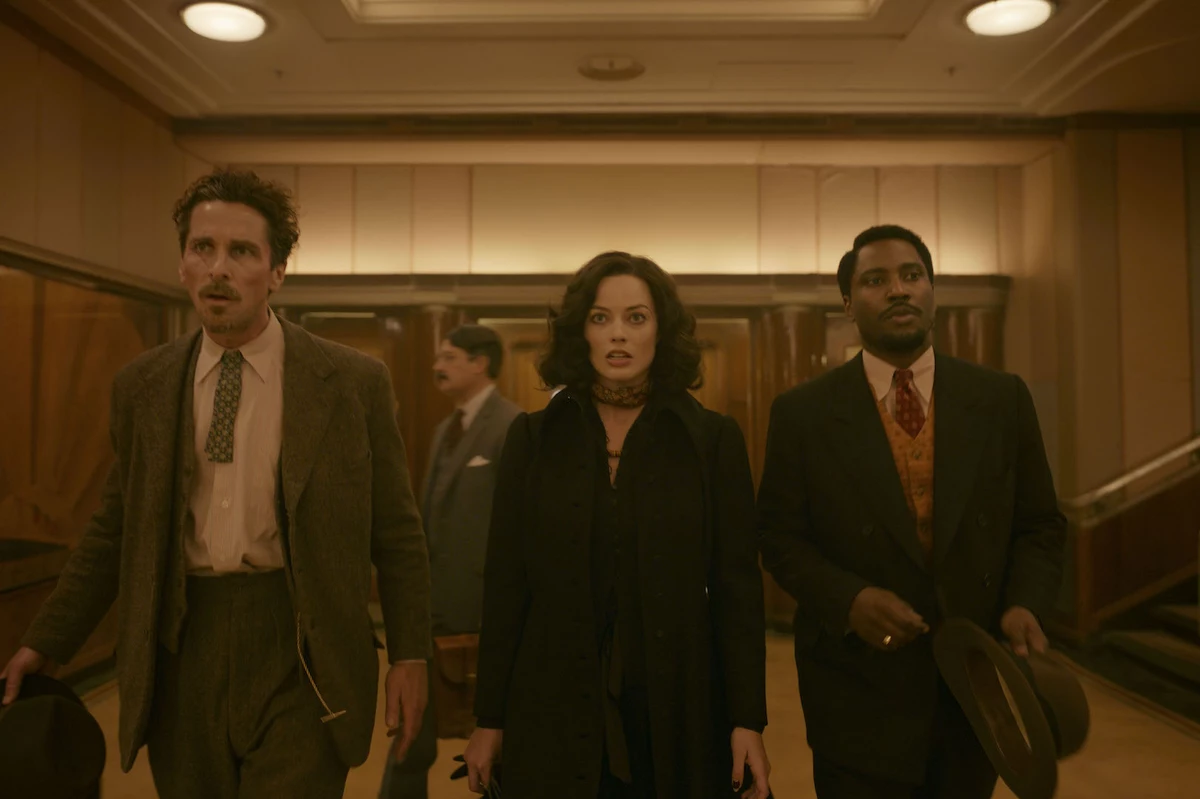
The biggest mystery in David O. Russell’s Amsterdam — far bigger than the one surrounding the dead body at the film’s center — is how did a movie with so many stellar elements turn out so mediocre? This movie has an absurd number of A-list stars, a.promising premise, a timely message, maybe our greatest living cinematographer, and a director who has made some excellent movies in the past. And yet even with all those outstanding components, something feels off about the end result. Sometimes you can get all the ingredients in the recipe right and still bake a bland cake. That’s Amsterdam: Looks fantastic, totally devoid of flavor.
Again, the early scenes are promising. Writer/director David O. Russell introduces us to Burt Berendsen (Christian Bale), a World War I veteran living in 1933 New York City. Burt works as a doctor with a somewhat unconventional approach to his job, particular with regards to medicine. Hampered by war injuries like a missing eye, and racked with constant pain, he laments the lack of effective medications to treat his maladies. When all else fails, he invents his own. It rarely goes well.
Then things get even worse after Burt is summoned by his old war buddy Harold (John David Washington) to help him with a medical procedure — which turns out to be an autopsy of the body of a great general (Ed Begley Jr.) they both served under in WWI. The general’s corpse sends Amsterdam off in two directions. Flashhacks reveal the origin of Burt and Harold’s friendship, and their mutual connection to a woman named Val (Margot Robbie) who nursed them back to health during the Great War. Meanwhile, in the present, Harold and Burt get framed for a crime and must go on the run to prove their innocence while simultaneously solving the mystery of their dead general. (The two cases are connected, naturally.)
AMSTERDAM20th Century Studios
That’s more than enough complication for a solid period thriller. But Russell seems totally disinterested in suspense, and pauses his story over and over for momentum-killing digressions. Some of the narrative back alleys the film explores are intermittently amusing. Mike Myers and Michael Shannon show up early in the film as a pair of businessmen with ulterior motives, and they return later to liven up what’s already become a fairly sedate mystery. Their scenes at least bring a little energy to the picture, thanks to Myers and Shannon’s witty interplay and larger-than-life characters. But even after all the flashbacks to World War I, Russell keeps wandering away from his A story. Right when the real killer is finally going to be exposed, the whole movie grinds to a halt for a series of musical numbers. At one point, everyone stops to watch someone play the glass harp.
One of the film’s few saving graces is its gorgeous cinematography by Emmanuel Lubezki. Even if you didn’t know he shot Amsterdam, it’s obvious within minutes that someone with a great eye was its director of photography. At a time when more and more moves look like they are designed to be “watched” at home by people distracted by their phones, here is a film with rich colors, detailed sets, gorgeous actors, and magnificent costumes. Amsterdam’s plot doesn’t deliver much in the excitement department, but Lubezki’s visuals alone keep things from getting too tedious — and Margot Robbie has never looked better onscreen than in this film. There are some close-ups of her face here that are legitimately jaw-dropping. (If only the murder plot had similarly shocking qualities.)
AMSTERDAM20th Century Studios
Amsterdam doesn’t ask much of Bale that he’s never done before in other, more compelling pictures (including at least one by David O. Russell; Burt is another American hustler who gets mixed up in an enormous conspiracy). But Bale brings his typical level of commitment, and is always a joy to watch. Earlier this year, he added incredible pathos to an underwritten villain role in the otherwise superficial Thor: Love and Thunder. He was almost too good; his Gorr was such a tragic figure he made it harder to laugh at the film’s goofy subplots like Thor having relationship problems with his magic axe.
In Amsterdam, Bale once again plays a role that isn’t much on the page. But he channels so much intensity through his eyes (well, through one eye; the other’s a fake) that we come to care about Burt anyway. Bale is so good so often, even in middling movies like Amsterdam, that I think we’ve begun to take him for granted. Today’s movie lovers are fortunate to be around to see his prime — and so is Amsterdam. This movie would be almost unwatchable without his soulful performance.
AMSTERDAM20th Century Studios
Amsterdam’s ultimate message about freedom and democracy couldn’t arrive at a better time. Whether audiences will be in the mood to hear it after two hours of lovely-looking monotony remains to be seen. This feels like the sort of movie someone might discover in a decade or two, see the cast involved, and wonder “How have I not heard of this movie?” Then they’ll watch it, and understand why.
RATING: 5/10

